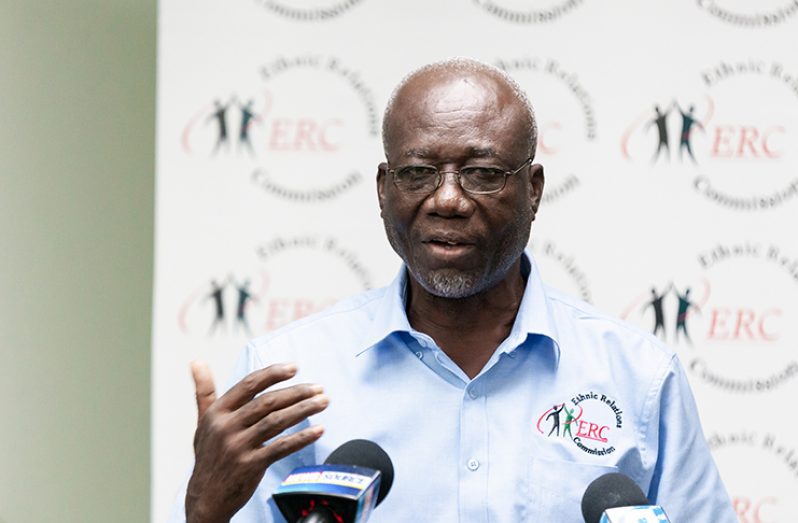…says ERC Commissioner Witter
GUYANA is known all around the world as the land of many waters, but it is also the land of many faces, as its population is made up of six ethnic groups: Amerindians, Europeans, Africans, East Indians, Portuguese and Chinese. However, the country, like many others, is still battling the scourge of racism.
During a virtual programme held by the International Decade for People of African Descent Assembly-Guyana (IDPADAG), Ethnic Relations Commissioner, Norris Witter, stated that the best and most effective way Guyana can eradicate racism is through education. “The best positive way in eliminating, in a permanent way, racial discrimination is through a process of education…no one is born a racist, you’re taught to be a racist, therefore, if we can unteach racism, racial prejudice and racial discrimination, then that will be a permanent solution to the situation,” Witter said.
Acknowledging that such is easier said than done, he noted that, “While it may be possible through education and moral persuasion to change the heart of persons who currently may embrace racial prejudice and discrimination, it is not likely that you will be able to convert everyone.”
Therefore, he added that it is important to have, in some instances, laws and regulations to restrain those persons who are not perceptible. Witter noted that such can be executed through the investigative and media monitoring arm of the ERC.
“Through an investigative arm of the subcommittee, those two bodies take on the responsibility of receiving complaints, processing those complaints and, depending on the outcome of those complaints, apply the necessary sanctions,” he said.
How the ERC works
Witter disclosed that when a complaint is sent to the commission, it goes to the media monitoring committee and the transgressor is invited and given a hearing. At the end of that hearing, if he or she is found culpable, depending on the gravity of the situation, legal penalties can be applied.
He added that apart from the ERC being nested with the task of investigating, it also has a prosecutorial role to inquire into complaints sent to it whether by individuals or organisations; as such, Witter stated, “If a complaint is found to be in violation of the people representation act or the racial hostility act, then the commission can agree to pursue private criminal action against those persons.”
We don’t have a wide range of power
Witter stated that many are of the belief that the ERC has the power to subpoena a man and lay charges upon him. However, he explained that such is not the case and prosecution should only be considered as a last result.
“Our foremost task is not to immediately move to the process of prosecution without exploring all the avenues that may be best suited given the circumstance; prosecution must be a last resort, there is a perception that the ERC has wide-ranging powers,” he said.
The commissioner added that the body does not have the power to subpoena persons who would have violated the law or made statements that are inflammatory, nevertheless, what they can do is invite transgressors to attend a hearing and merely hope that they respond.
Breaking new grounds
Nevertheless, he noted that the commission is seriously considering its option to prosecute. “We are looking at the possibility of prosecution, but we don’t have a precedent to go by, so we will be breaking new grounds.”
However, when addressing the issue of prosecution, Witter articulated that one must take into consideration the fact that the current commission has only been in office for two and a half years, while the commission itself has been in existence for over 18 years.
The previous commissions, he added, never prosecuted anyone , but due to the current situation and a plethora of statements that can do deplorable damage to social cohesion and the country’s state, the commission will be working on the way forward to prosecute transgressors.




.jpg)









